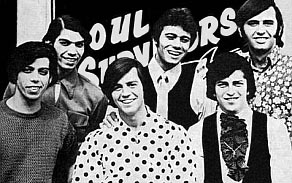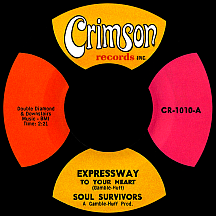SOUL SURVIVORS
Expressway to Your Heart
New York City's Soul Survivors came into existence on the gridlocked, bottlenecked New Jersey Turnpike. The song "Expressway to Your Heart" was created during a traffic jam on a Pennsylvania freeway. It turned out those two separate incidents on well-traveled roads equaled one big hit record.
There was a collision on the turnpike one foggy night in 1966, one car carrying three musicians on their way to a gig (organist Paul Venturini, guitarist Chuck Trois and drummer Joe Forgioni), the other car with three singers (Kenney Jeremiah, Charles Ingui and his brother, Richard Ingui). All six walked away unharmed, one of them asked, "How did we ever survive?" and just like that the singers had found a backing band and a name that fit the circumstances. Sometime the following year, a little to the south on the Schuylkill Expressway heading into Philadelphia, songwriter Kenny Gamble, anxious to show up on time for a date with his girlfriend, was stuck in bumper-to-bumper traffic, which gave him the idea for the song's concept: 'I've been tryin' to get to you for a long time...on the expressway to your heart!'
The Dedications had been formed in the late '50s in Queens, New York, and after establishing themselves locally they had a single issued in 1962, "Why Don't You Write Me" (a remake of The Jacks' seven-year-old R&B classic), on the Card label. As members left the quintet soon afterwards, future Soul Survivors Kenney, Charlie and Richie were added and contributed to the group's next 45, "Shining Star" on C&A. The records didn't sell, but the group kept busy for the next couple of years performing in N.Y., Jersey and a few other parts of the east coast; one other release on Bell in 1965, "I Ain't a Bit Sorry," written by Bill Giant, Florence Kaye and Bernie Baum, was a strong effort with an updated sound. By the time the accident occurred on that fateful, foggy evening, the Dedications were done, the remaining vocal trio finding themselves at a dead end right before the situation improved. As a self-sufficient six-man band, they started getting better bookings in New York, Atlantic City and more importantly Philadelphia, where Gamble and his rush-hour partner Leon Huff took notice.
Kenny Gamble had been working in Philly with producer-songwriter Jerry Ross, penning minor hits in '63 and '64 for Freddy Cannon and Candy and the Kisses as well as a top 40 hit for The Sapphires, "Who Do You Love." Leon Huff took a test drive with Patty and the Emblems' "Mixed-Up, Shook-Up, Girl," a breakthrough for him in 1964. Kenny and Leon occasionally crossed paths while doing studio work for the city's Cameo-Parkway and Swan labels and began collaborating regularly in 1966, achieving success that year as a producing and composing team for their own Gamble label with "(We'll Be) United," the single that kicked off a string of hits for The Intruders.

Crimson Records was a small label attempting to revive a few doo wop acts, primarily Lee Andrews and the Hearts, before the more contemporary Soul Survivors were signed and their debut single, Gamble and Huff's "Expressway to Your Heart," fooled radio listeners with its soulful sound, convincing many that the group members were black. The record broke the speed limit right out of the gate, becoming one of the hottest top ten hits of the fall of 1967. The funkier "Explosion in Your Soul" came next and hit the top 40 in early 1968. Spring's "Impossible Mission (Mission Impossible)," unrelated to the popular CBS-TV series other than the title, completed a trio of charting singles, all masterminded by Gamble and Huff in the process of developing a strategy for long-term hitmaking.
The band took a detour to Atco Records late in the year, a seven-man outfit by that time after the earlier departure of Trois and addition of guitarist Edward Leonetti and bassist Tony Radicello. "Mama Soul," an infectious track from the spring of '69, produced by Rick Hall at the FAME studio in Muscle Shoals, Alabama, is the best-known of their three singles on the label. The band split up in the early '70s, but Charles and Richard put together a new version of the group around 1972. Gamble and Huff, having taken Philly soul music up several notches with major hits by artists like The O'Jays, Harold Melvin and the Blue Notes and Billy Paul on their Philadelphia International label, didn't forget their anglo Soul Survivors, signing them to a new deal on the company's TSOP label. "City of Brotherly Love" spent several weeks on the soul singles charts in the fall of 1974.


